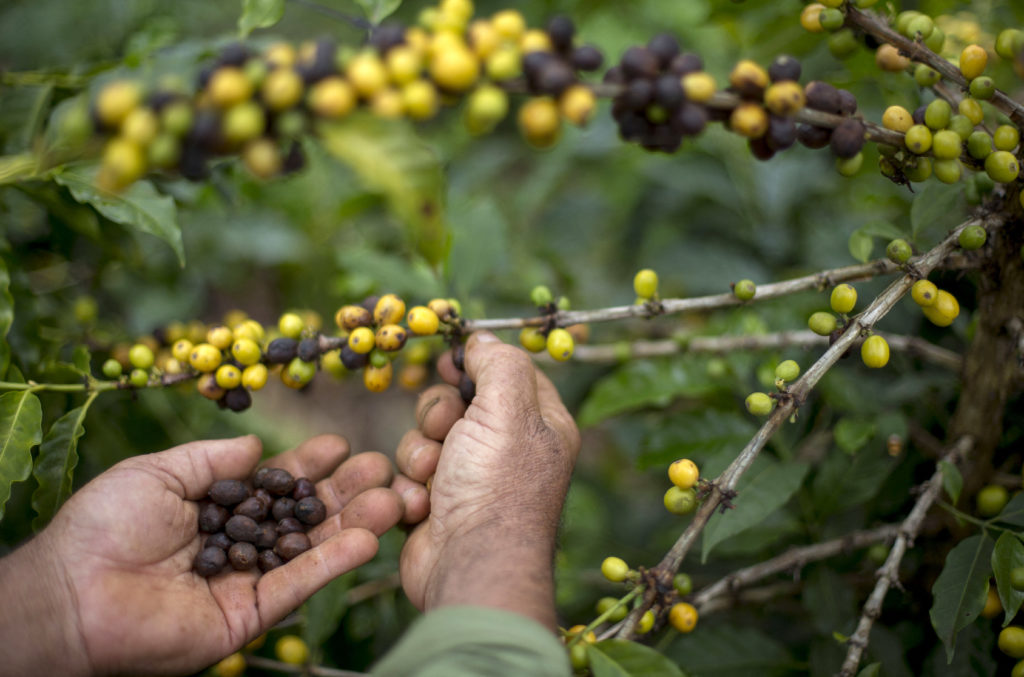São Paulo – The Brazilian Coffee Exporters Council (Cecafé) plans to work on product branding in Saudi Arabia this year, with an emphasis on environmental and social sustainability and the different producing regions. Pictured above, a grower picks coffee in the Caparaó area, which spans municipalities in the states of Espírito Santo and Minas Gerais.
The idea of increasing sales to Saudi Arabia came from the work being done by Cecafé in China over the past few years. “We have come to the point where we are in permanent contact with prospective clients, but now we are considering working on brand promotion like we did in China. This involves promotional videos, submission of product samples, and work to raise awareness regarding Brazil. In the post-pandemic, the work should involve exchange – bringing them to coffee-growing areas in Brazil and attending trade shows in China,” Cecafé CEO Marcos Matos said.
The plan already underway involves steering Brazil’s image away from its status as a mammoth producing country, and towards stories that will connect with shoppers. “We are looking to tell more humane stories, to show who the growers are, how they live, how the production chain works in Brazil, and our coffee-growing areas,” said Matos.
- Here’s more on this:
Driven by North Africa, Brazilian coffee sales to Arabs up
Even though Saudi Arabia ranks 6th in terms of Arab markets and 37th in overall exports from Brazil, it has been picked as a target in a bid to improve the regionwide status of Brazilian coffee. Sales from Brazil to Arab countries have gone up 11.2% on average per year since 2016. “We discussed halal certification during a big meeting with over 120 associates in attendance. That was impressive. We are setting our sights on Arab countries, and the particularities of each nation will be part of our learning curve,” he said regarding a meeting held last February.
The interest shown by associates was an indication that sales volume and quality is poised to increase. “The Arab market imports mostly Arabica-type coffee, Rio-type coffee, but sales to café chains and specialty coffee sales are going up, and we must pay attention to all possibilities. We are aware of where we are right now, but also of the trends. There’s a great market available,” said Matos.
The protracted pandemic meant the plan had to go fully online. “The pandemic got in our way a little bit. We were hoping to be more aggressive, but everything works out, once we’re all vaccinated, we want to interact at a higher level.”
Here’s more on this:
- Importer sells Brazilian coffee in Dubai-based e-commerce
- Café to serve Arabic coffee, Moroccan tea in São Paulo
On Cecafé’s radar at this point are trade shows, B2B events, and outreach to Arab content producers on coffee. “We intend to work with influencers and journalists in Saudi Arabia, to reach out to people who spread information about coffee,” said Matos. He’s hoping to stress the sustainability factor, which Cecafé has been working on at least since the year 2000. “We intend to make videos in Arabic. This is a lesson we learned a while ago: that it’s important to create content in local language, and not just in English.”
Making product samples available is also key to striking deals. “Sending out green coffee is important, because clients have their own approach to roasting and grinding.” In the second half of 2021, Cecafé hopes to provide samples to the Embassy of Brazil in Riyadh and other diplomatic offices for distribution across Saudi Arabia.
Just like with the expansion plans in China, work in Saudi Arabia will be done by a team spanning multiple sections of the industry, in partnership with organizations such as the Brazilian Specialty Coffee Association, the Brazilian Trade and Investment Promotion Agency (Apex-Brasil) and the Brazilian Ministry of Agriculture, Livestock and Supply.
Last March, Cecafé’s technical director Eduardo Heron and executive secretary Isabela Costa had an online meeting to discuss the project with Brazilian government officials including Marcel Moreira Pinto, Brazil’s agricultural attaché to Riyadh, and Jean Marcel Fernandes, director of the Agriculture Ministry’s Commercial Promotion and Investments Departament.
Translated by Gabriel Pomerancblum




